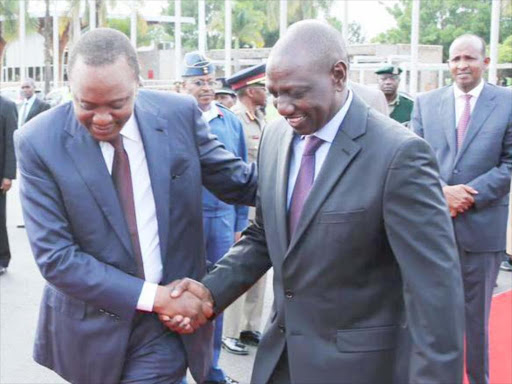President Uhuru Kenyatta seems to have taken over all the "lucrative " Cabinet positions leaving his deputy William Ruto hanging onto portfolios considered less prestigious.
Following Tuesday's Cabinet reshuffle, Uhuru's appointees are now in charge of 16 of the 21 ministries. Ruto's allies now hold only five Cabinet portfolios.
The development is a far cry from the 50-50 arrangement he had with Ruto in 2013 when they named Jubilee's first Cabinet.
The plum dockets under Kenyatta's firm grip control over three-quarters of the country's national budget and are largely charged with delivering the Big Four Agenda.
During their first term, when their camaraderie was at its apex, the two shared government Cabinet portfolios in an almost equal basis.
But from the beginning of his second term in 2017, the President has been chipping away at Ruto's share as tensions between them rise.
With his eyes focused on his legacy projects, the President has seized full control of the running of government, a responsibility he appeared to have been willing to delegate in their first term.
Among the critical portfolios controlled by Kenyatta's men include the Treasury headed by Ukur Yatani and Interior and Coordination headed by Fred Matiang'i.
The President has also handed over the giant agriculture Ministry to Peter Munya, making him one the most powerful CSs in the Jubilee administration.
The ministry, now called Agriculture, Fisheries, Livestock and Cooperatives with four principal secretaries was run by a Ruto ally in the first term.
The Ministry of Transport, Infrastructure, Housing, Urban Development and Public works, with a total of five PSs is also under James Macharia, Kenyatta's man.
Others are ministries of Education which is under George Magoha who, according to sources, Kenyatta has a lot of respect for. Health to be led by Mutahi Kagwe and Water and Irrigation's under Sicily Kariuki are other influential ministries.
The President also runs the show at the ministries of Foreign Affairs through Rachel Omamo, Defence through Monica Juma, Devolution through Eugene Wamalwa, Public Service led Margret Kobia, ICT which is headed by Joe Mucheru, Petroleum and mining through John Munyes and Environment which is under Keriako Tobiko.
Ruto who is busy campaigning to succeed Uhuru has remained with only the Lands ministry headed by Farida Karoney, Labour which was handed to Simon Chelughui, East African Community which is with Adan Mohamed and Industrialisation which has been given to CS nominee Betty Maina.
Former Kericho Senator Charles Keter enjoys cordial relationships with both Kenyatta and Ruto.
President Uhuru's decision to drop Mwangi Kiunjuri from the Cabinet showed his long-held push to consolidate control of powerful ministries and government departments.
“The President is formally taking control because the buck stops with him. He is looking at areas of weaknesses so that he can deliver on his promises,” political analyst Felix Odhiambo said.
Odhiambo, a governance and policy expert, said the President wants to leverage on the handshake to harness all that can enable him to cement his legacy as the end of his term draws nigh.
“The Deputy President started fighting too early. The president must now take charge of all programmes that are critical in building his own legacy,” he added.
After the 2013 General Election, the two leaders appeared to read from the same script and shared key portfolios in government.
“The president wants to have the people he trusts conduct businesses he believes will determine his legacy. He is the appointing authority and wants some matters handled in a manner he wants,” former South Mugirango MP Manson Nyamweya said.
Nyeri Town MP Ngunjiri Wambugu said the President was right to reorganise his government.
"If the President believes you are not delivering on the assignment he gave you, he will relieve you and allow you to concentrate on what you want to do," he told the Star.
It is telling that President Uhuru acted to confirm National Treasury CS Ukur Yatani after he took over the position in an acting capacity.

The country's purse strings were initially under Henry Rotich, a native of Ruto's Rift Valley backyard and who was finally on Tuesday fired from the Cabinet.
Yatani had assumed the reins at the National Treasury in July last year following Rotich's arraignment over graft charges in the Sh63 billion Kimwarer and Arror dams scandal.
At Maji House, the President kicked out Ruto's ally Chelugui and installed his trusted confidant Kariuki.
Kariuki has been spearheading the implementation of the President's universal health coverage and is seen as both abrasive and ruthless in her leadership style.
Incidentally, the irrigation docket had been hived off the Agriculture ministry when Uhuru named the first Cabinet after being sworn in for a second term.
However, it was returned to the Water docket last year in what was seen as a scheme to whittle down Kiunjuri's influence at Kilimo House.
Seen as part of a grand plan to deflate Ruto, Uhuru in 2018 also hived off the Petroleum and Mining docket from the Energy ministry headed by former Kericho Senator Charles Keter.
Former Turkana Senator Munyes, seen as a close Uhuru ally, was named the new Petroleum and Mining cabinet secretary.
Without the petroleum docket, Keter was left without the lucrative Kenya Pipeline Company
During Tuesday's reorganisation of government, the president named Betty Maina the CS for Industrialisation but hived off the plum Cooperatives docket in favour of Munya at the Agriculture ministry.
Betty hails from the DP's Rift valley backyard as does Lands CS Faridah Karoney.
The President also shoved off Ruto's other ally Patrick Ntutu from the Interior and Coordination docket as the chief administrative secretary to the ministry of labour in the same capacity.
Ntutu's demotion was seen as the President's response to the former lawmaker's close relationship with the DP.

 © The Star 2024. All rights reserved
© The Star 2024. All rights reserved